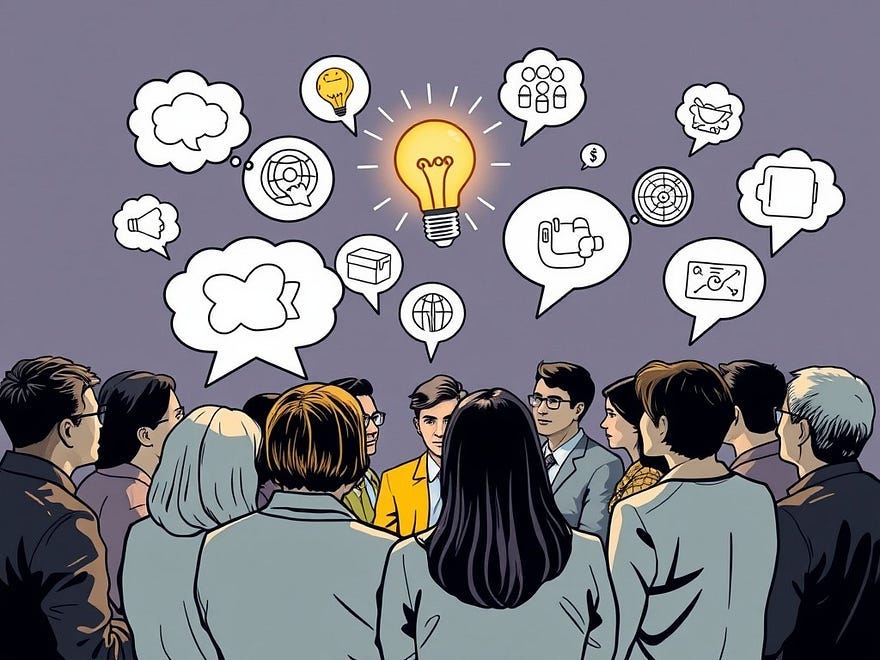Stop Nodding and Start Challenging: Listening to Create Debate
Learn how challenging ideas respectfully during conversations can foster innovation, better decisions, and stronger relationships.
Ever found yourself nodding along in a conversation, only to realise later you didn’t agree with a single word? Yeah, me too.
It’s easy to fall into the trap of passive listening, especially when we’re afraid of rocking the boat.
But real growth happens when we stop nodding and start challenging.
This isn’t about being argumentative or winning debates. It’s about creating spaces where ideas can clash, spark, and evolve.
When we listen to understand—not just to respond—we open doors to innovation, better decisions, and deeper connections.
So, let’s talk about the art of active disagreement.
How can we challenge ideas respectfully?
How can we turn debates into opportunities for growth?
And why is listening the secret weapon in all of this?
Key Takeaways
Active listening is the foundation of meaningful debate.
Challenging ideas respectfully fosters innovation and better decision-making.
Healthy disagreement strengthens relationships and builds trust.
Debate is a tool for personal growth and self-improvement.
The goal isn’t to "win,” but to learn and grow.
Why We Nod Instead of Challenge
Let’s face it: nodding is easy. It’s safe. It keeps the peace. But it also keeps us stuck.
I remember sitting in a team meeting once, listening to a proposal that didn’t sit right with me. Instead of speaking up, I nodded along.
Later, when the plan fell apart, I couldn’t help but think, “If only I’d said something.”
We nod because we’re afraid of conflict. We don’t want to seem difficult or rude.
But here’s the irony: by avoiding disagreement, we often create bigger problems down the line.
The Power of Active Listening
Before we can challenge ideas, we need to listen—really listen. Active listening isn’t just about hearing words; it’s about understanding the person behind them.
Here’s how I’ve learned to do it:
Focus on the speaker. Put away distractions and give them your full attention.
Ask clarifying questions. “Can you explain that further?” or “What makes you say that?”
Reflect back. Summarise what you’ve heard to show you’re engaged.
When we listen this way, we’re not just preparing our next argument. We’re building a foundation for meaningful dialogue.
How to Challenge Ideas Respectfully
Challenging ideas doesn’t mean tearing them down. It means asking questions, offering alternatives, and inviting deeper thinking.
Here are some strategies I’ve found helpful:
Start with curiosity. Instead of saying, “That’s wrong,” try, “What led you to that conclusion?”
Acknowledge the value. Even if you disagree, find something to appreciate. “I like how you’re thinking about X, but have you considered Y?”
Use “I” statements. “I see it differently” feels less confrontational than “You’re wrong.”
Remember, the goal isn’t to prove someone wrong. It’s to explore ideas together.
Debate as a Tool for Innovation
Some of the best ideas come from the clash of opposing viewpoints.
Think about it: if everyone always agreed, we’d never push boundaries or think outside the box.
I once worked on a project where two team members had completely different approaches.
At first, it seemed like a disaster waiting to happen. But as they debated, they started combining their ideas. The result? A solution neither could’ve come up with alone.
That’s the magic of debate. It forces us to think critically, question assumptions, and see things from new angles.
Building Stronger Relationships Through Disagreement
It might sound counterintuitive, but disagreement can actually bring people closer. When we challenge each other respectfully, we show that we care enough to engage.
I’ve had some of my most meaningful conversations with people I disagreed with. By listening and debating openly, we built trust and respect.
The key is to separate the idea from the person. You’re not attacking them; you’re exploring an idea together.
Personal Growth Through Debate
Debating isn’t just about changing others’ minds. It’s about changing your own.
Every time I challenge an idea—or have my own ideas challenged—I learn something new. It’s uncomfortable at times, but that discomfort is where growth happens.
Debate teaches us humility, resilience, and the value of different perspectives. It’s a workout for the mind, and like any workout, it makes us stronger.
Wrapping Up
So, the next time you’re in a conversation, resist the urge to nod along. Listen actively, challenge respectfully, and embrace the power of debate.
It’s not about being right. It’s about being open. Open to new ideas, new perspectives, and new possibilities.
When we stop nodding and start challenging, we don’t just create better debates. We create better outcomes—for ourselves, our teams, and our relationships.
Thanks for reading...
If you enjoyed reading my story, please like and share any parts you think other readers would find interesting.
Don’t forget to leave your comments about what you thought of this story.
Consider following me here on Substack and subscribing to my stories.


